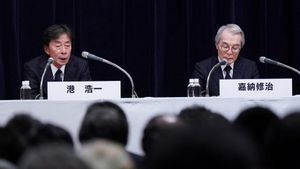Japanese celebrity Nakai Masahiro is currently under scrutiny following allegations of harassment against him, which emerged alongside the announcement of his settlement with the accuser. This situation has prompted conversations about handling harassment cases within the entertainment industry and the responsibilities of media outlets.
Nakai, 52, announced on the 9th of this month the resolution to the allegations, which reportedly arose from interactions at a dinner gathering. Even though the details of the settlement are shrouded in confidentiality, the presence of non-disclosure agreements raises questions about the transparency of such incidents.
According to attorney Sakura Ueque, "confidentiality obligations may prevent both parties from speaking on the matter publicly." These restrictions often complicate the broader discourse surrounding harassment, leaving victims feeling isolated and unresolved.
The claims against Nakai not only highlight the individual case but also shed light on how organizations, such as Fuji Television, approach investigations involving their personalities. Following reports of the claims, Fuji Television set up a committee to address the concerns, yet their credibility is at stake, especially after allegations of mishandling the situation surfaced.
Despite the establishment of this committee, observers are questioning whether Nakai and the accuser will be able to participate meaningfully, considering the specific terms of the settlement may prohibit public commentary.
Many legal experts and analysts are voicing skepticism about the matter's treatment. "The situation illuminates the challenges of addressing gender-related issues and ensuring proper investigation processes," commented one legal analyst. This feeling is echoed across public opinion as calls for accountability and change within the media continue to grow.
Nakai's case is not isolated; it emerges amid increasing scrutiny toward various celebrities reported to have been involved in similar allegations, leading to widespread conversations on imperatives for transparent reporting and ethics within entertainment. This environment emphasizes the necessity for companies to uphold stringent anti-harassment measures and support individuals impacted by such experiences.
Internally, Fuji Television faced backlash from stockholders and the public for how they managed the situation, leading to corporate stress and divisions among their staff. A letter of complaint from major shareholder Dalton Investments indicates high levels of dissatisfaction with the corporate response.
At the heart of this scandal lies the delicate balance between confidentiality for both parties and the public's right to informed discourse about societal issues surrounding harassment. Nakai's situation has become emblematic of the larger challenges faced by the entertainment industry as it confronts its past and sets standards for the future.
Attention is now directed at how institutions will adapt their strategies as they engage with the rising demands for supporting victims and ensuring justice. The resolve shown by many advocates, including Ueque, is laudable as they continue their fight to reform the systemic shortcomings related to reporting abuse and harassment.
With Nakai’s case continuing to develop, the outcome will likely resonate beyond his personal boundaries, impacting the broader industry standards and cultivating discussions around the importance of ethical practices. The future of entertainment is at stake and how these matters are navigated will set precedent.



